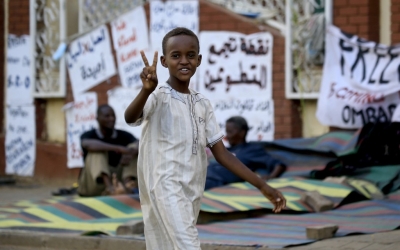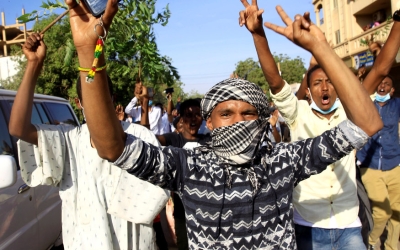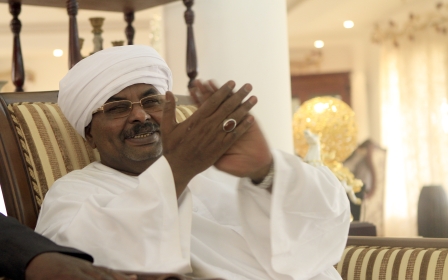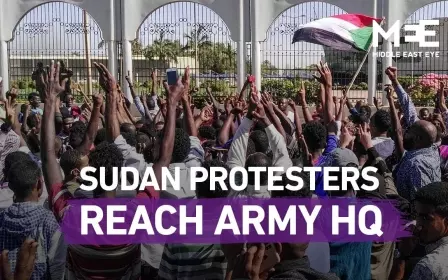Sudan protesters seek talks with army to form a transitional government

The Sudanese group spearheading months-long protests against President Omar al-Bashir's rule have called on the army to hold direct talks with demonstrators about forming a transitional government.
Their request comes hours after Sudanese soldiers intervened on Monday to protect protesters from security forces who attempted to break up a sit-in outside a complex in Khartoum that includes the defence ministry, army headquarters and the president's residence.
"We call on the Sudanese armed forces to talk directly with the Alliance for Freedom and Change for facilitating the peaceful process of forming a transitional government," Omar el-Digeir, a senior member of the group, said in a statement outside the complex where thousands of demonstrators have massed since Saturday.
Why are Sudanese protesting against their government?
+ Show - HideSudanese protests have evolved in the space of less than six months from complaints about bread prices to calls for long-term leader Omar al-Bashir to go and demands for a civilian-led transition to democracy.
Here's a summary of the key moments so far since the protests began.
19 December 2018: People take to the streets in the city of Atbara to protest against a government decision to triple the price of bread, torching a local ruling party office. By the next day protesters on the streets of Khartoum and other cities calling for "freedom, peace, justice". Police try to disperse the crowds, resulting in at least eight deaths. Dozens more will be killed in the weeks of protest that follow
22 February 2019: Sudanese President Omar al-Bashir declares a nationwide state of emergency. He swears in a new prime minister two days later, as riot police confront hundreds of protesters calling for him to resign
6 April: Thousands gather outside the army's headquarters in Khartoum, chanting "one army, one people" in a plea for the military's support. They defy attempts by state security forces to dislodge them and troops intervene to protect them
11 April: Military authorities announce they have removed Bashir and that a transitional military council will govern for two years. Despite celebrations at Bashir's demise, protest leaders denounce the move as a "coup" and the protesters remain camped outside army headquarters.
14 April: Protest leaders call on the military council to transfer power to a civilian government
20 April: Sudan's military rulers hold a first round of talks with protest leaders
27 April: The two sides agree to establish a joint civilian-military ruling council, but talks stall over differences in the composition of the council, with both sides demanding a a majority
15 May: With negotiators reported to be close to agreeing a three-year transition to civilian rule, military leaders suspend talks and insist protesters remove barricades outside the army's headquarters. Talks resume on 19 May but break down again on 20 May, with the opposition insistent that a civilian must head the transitional governing body
28 May: Thousands of workers begin a two-day strike to pressure the military rulers and call for civilian government
3 June: At least 35 people killed and hundreds injured, according to opposition-aligned doctors, as security forces firing live ammunition move to disperse the protest camp outside army headquarters
4 June: General Abdel Fattah al-Burhan, the head of the military council, announces that all previous agreements with protest leaders are scrapped and says elections will be held in nine months
Digeir said the protest organisers had also formed a council to initiate talks with security forces and the international community aimed at agreeing on a political transition that gives power to a "transitional government that represents the wish of the revolution".
"We reiterate our people's demand that the head of the regime and his government have to immediately step down."
Stay informed with MEE's newsletters
Sign up to get the latest alerts, insights and analysis, starting with Turkey Unpacked
'We reiterate our people's demand that the head of the regime and his government have to immediately step down'
- Statement from Alliance for Freedom and Change
"We also call on the Sudanese armed forces to withdraw their support for a regime that has lost its legitimacy," Digeir said, reading from a statement issued by the alliance.
"We call on the Sudanese armed forces to support the Sudanese people's alternative for a transition to a civilian democratic government."
The Alliance for Freedom and Change is an umbrella group of political parties and unions representing doctors, engineers and teachers that has led the protest movement against Bashir since December.
The rally outside the army headquarters, now in its third straight day, has been the largest since protests began on 19 December in the central town of Atbara, quickly spreading to the capital and towns and cities across the east African country.
Several vehicles carrying NISS personnel and riot police arrived in the early hours on Monday, witnesses told the AFP news agency.
One protester, Hamid Abdullatif , told MEE, that clashes erupted around six in the morning.
“The security organs tried to attack the protesters who slept in front of the military
headquarters, but a group of soldiers camped in front of the building exchanged fire with [security forces],” Abdullatif said.
Other witnesses told AFP that gunshots were heard, but it was not clear who fired the shots.
Two people were shot and killed during protests on Monday, including one civilian and one soldier, according to the Central Committee of the Sudanese Doctors.
It was not immediately clear who was responsible for the deaths. The committee said seven people have been killed in total since Saturday.
Protecting protesters
Earlier on Monday, soldiers intervened to keep protesters safe as security forces on pickup trucks fired tear gas towards thousands of demonstrators, witnesses told Middle East Eye.
The protesters accuse Bashir's administration of economic mismanagement that has led to soaring food prices and shortages of fuel and foreign currency.
Meanwhile, Sudanese government spokesman and Minister of Information Hassan Ismail told the pro-government Sudanese Media Center (SMC) that the army was acting under government orders.
“[All government] forces are dealing with the situation in the capital Khartoum in a wise way, refraining from any violence,” he said.
Kamal Abdul Maroof, chief of staff of the Sudanese national army, later confirmed Ismail's statements.
In a press release, Maroof said the military would never abandon its responsibility in maintaining the security and stability of the country, and stressed that no divisions exist between the police, security forces and the military.
Since protests erupted across Sudan in December, agents of the powerful National Intelligence and Security Service (NISS) and riot police have cracked down on demonstrators, but the army had not so far intervened.
'I could feel the gas in the air'
Tear gas shot by security forces made its way to a neighbourhood about five kilometres away from the army complex, the heart of the protests.
"I stepped out on my balcony hearing the sound of the gas canisters and could feel the gas in the air," said one resident.
A few hours later security personnel again fired tear gas at the protesters, witnesses said.
The European Union said an "unprecedented" number of people had come out calling for change since Saturday.
"The people of Sudan have shown remarkable resilience in the face of extraordinary obstacles over many years," the EU's External Action Service said.
"Their trust must be won through concrete action by the government."
Anniversary date
Protests first erupted in December after a government decision to triple the price of bread, but they quickly morphed into nationwide demonstrations against Bashir's rule.
In recent weeks, the scale and intensity of protests had dwindled due to a state of emergency imposed by Bashir, but Saturday saw a resurgence with thousands of protesters staging a continuous rally outside the army complex.
Protest organisers chose 6 April for the latest rally to mark the 1985 uprising that toppled the regime of then-president Jaafar Nimeiri.
Officials say 32 people have died in protest-related violence so far, while Human Rights Watch has put the death toll at 51.
After a meeting chaired by Bashir on Sunday, Sudan's security council said the demands of the protesters "have to be heard".
Wanted by the Hague-based International Criminal Court for alleged war crimes and genocide in the region of Darfur, Bashir swept to power in an Islamist-backed coup in 1989.
He has remained defiant, introducing tough measures that have seen protesters, opposition leaders, activists and journalists arrested.
Middle East Eye delivers independent and unrivalled coverage and analysis of the Middle East, North Africa and beyond. To learn more about republishing this content and the associated fees, please fill out this form. More about MEE can be found here.






